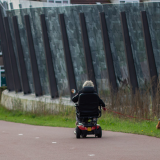
Serviços públicos
Os serviços públicos, tais como a saúde, a educação, a assistência social e os transportes, são essenciais para a obtenção de níveis elevados de proteção social, coesão social e inclusão social. Mas é a qualidade e o acesso aos serviços que determina o seu sucesso numa conjuntura social e demográfica em mutação.
O desafio que se coloca aos decisores políticos é o de garantir a conceção e prestação de serviços sociais e de saúde capazes de responder às variadas necessidades dos cidadãos. Esse desafio tem sido dificultado pela imposição de severas restrições financeiras nos últimos anos e pela procura crescente desses serviços, motivada, por um lado, pelo envelhecimento demográfico e, por outro lado, pelo afluxo de refugiados à Europa. Além da acessibilidade e da qualidade, outras questões emergem neste momento. Nestas se inclui o risco de os novos canais digitais de prestação de serviços poderem isolar comunidades que já se encontram em desvantagem e de viram a criar dificuldades na criação de padrões de acesso e qualidade dos serviços.
O Pacote de Investimento Social, lançado em 2013 pela Comissão, insta os Estados-Membros a colocar maior ênfase na prestação de serviços públicos de elevada qualidade. Além disso, a estratégia do Mercado Único Digital para a Europa, adotada pela Comissão em 2015, insiste na necessidade de modernizar os serviços públicos para reforçar a competitividade. A utilização das novas tecnologias, os serviços públicos em linha e a interoperabilidade transfronteiriça são essenciais para melhorar a relação custo/benefício e a qualidade dos serviços prestados. Em abril de 2017, a Comissão lançou um pacote de iniciativas ao abrigo do Pilar Europeu dos Direitos Sociais que consagra, nos seus princípios, o acesso a educação de boa qualidade, a serviços de educação e de acolhimento na primeira infância, a cuidados de saúde, a habitação social e a outros serviços essenciais.
- Comissão Europeia: Pacote de Investimento Social
- Comissão Europeia: Mercado Único Digital
- Comissão Europeia: Pilar Europeu dos Direitos Sociais


















